沪教版六年级英语下册Unit1~4复习资料资料讲解
沪教牛津英语六年级下册 Module 1-4 知识清单
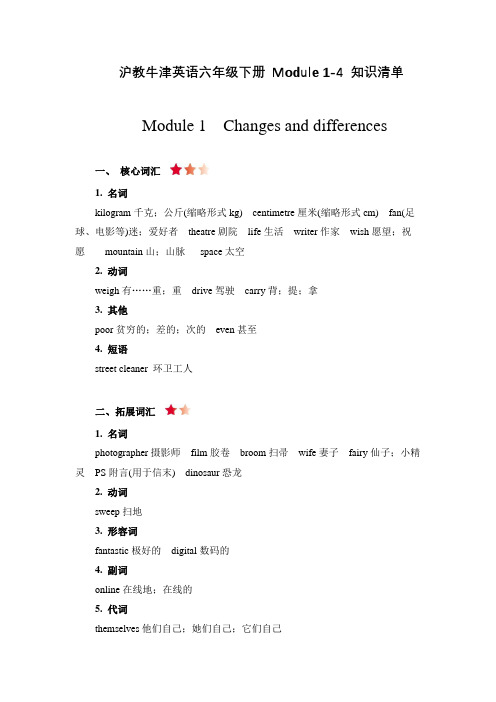
沪教牛津英语六年级下册Module 1-4 知识清单Module 1Changes and differences一、核心词汇1. 名词kilogram千克;公斤(缩略形式kg)centimetre厘米(缩略形式cm)fan(足球、电影等)迷;爱好者theatre剧院life生活writer作家wish愿望;祝愿mountain山;山脉space太空2. 动词weigh有……重;重drive驾驶carry背;提;拿3. 其他poor贫穷的;差的;次的even甚至4. 短语street cleaner 环卫工人二、拓展词汇1. 名词photographer摄影师film胶卷broom扫帚wife妻子fairy仙子;小精灵PS附言(用于信末)dinosaur恐龙2. 动词sweep扫地3. 形容词fantastic极好的digital数码的4. 副词online在线地;在线的5. 代词themselves他们自己;她们自己;它们自己6. 其他taller更高的7. 短语go fishing去钓鱼enjoy oneself玩得愉快;得到乐趣get …in收割street sweeper扫地车by hand用手right away立即;马上in a short time很快head teacher 校长 a piece of一张;一片have a picnic去野餐better and better越来越好三、核心句型1. I’m 150 centimetres tall. 我身高150厘米。
解读:这是介绍身高的句型。
“主语+ be动词+ 数字+ 长度单位(+ tall).”可以用来介绍某人的身高。
举一反三:My cousin is 154 centimetres tall. 我的堂弟身高154厘米。
Jim is 149 centimetres tall. 吉姆身高149厘米。
2. There are a lot of tall buildings in the city. 城市里有很多高大的建筑物。
牛津沪教版英语六年级下基础知识复习
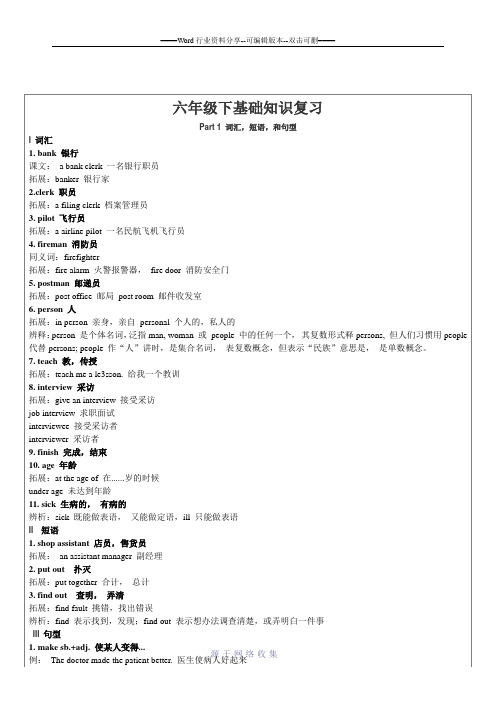
5. postman邮递员
拓展:post office邮局post room邮件收发室
6. person人
拓展:in person亲身,亲自personal个人的,私人的
辨释:person是个体名词,泛指man, woman或people中的任何一个,其复数形式释persons,但人们习惯用people代替persons; people作“人”讲时,是集合名词,表复数概念,但表示“民族”意思是,是单数概念。
2.Mary is absent from the class today,because she is ill.玛丽今天没有来上课,因为她生病了。
B.because不能和so同时出现在一个句子中。例如:
(错)Because it is raining outside,so we can't go shopping today.
A.What would you like to be?你想成为什么?
这是由what引导的特殊疑问句用来询问某人希望自己将来从事什么职业,例如:
1.--What would you like to be?你想成为什么?
--I'd like to be a doctor.我想当一名医生。
2.--What would your sister like to be?你姐姐想成为什么?
1.I’d hate you to thinkIwas criticizing you.我可不愿让你觉得我是在批评你。
2.I'd be only too glad to help.我非常愿意帮忙。
B.缩略式常写为“’d”,I’d=Iwould我想……否定式为would not,其缩略式为“wouldn’t”,例如:
沪教牛津版六年级(预初)下册英语知识点归纳
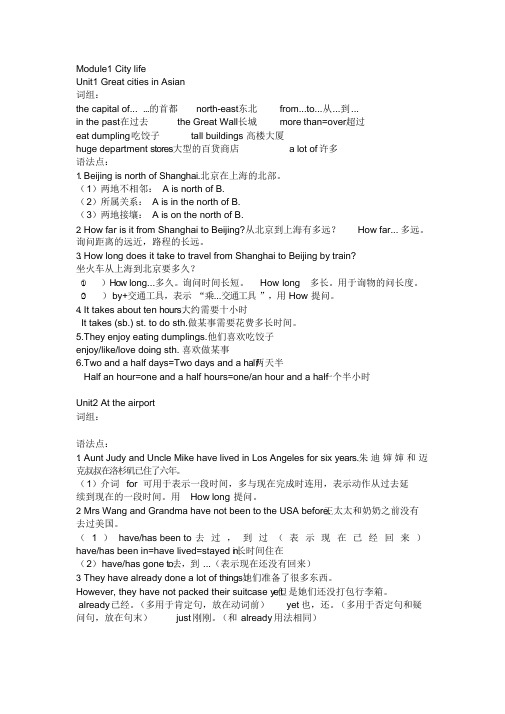
Module1 City lifeUnit1 Great cities in Asian词组:the capital of... ...的首都north-east东北from...to...从...到...in the past在过去the Great Wall长城more than=over超过eat dumpling 吃饺子tall buildings 高楼大厦huge department stores大型的百货商店 a lot of 许多语法点:1.Beijing is north of Shanghai.北京在上海的北部。
(1)两地不相邻: A is north of B.(2)所属关系:A is in the north of B.(3)两地接壤:A is on the north of B.2.How far is it from Shanghai to Beijing?从北京到上海有多远?How far... 多远。
询问距离的远近,路程的长远。
3.How long does it take to travel from Shanghai to Beijing by train?坐火车从上海到北京要多久?(1))How long...多久。
询问时间长短。
How long 多长。
用于询物的问长度。
(2))by+交通工具,表示“乘...交通工具”,用How 提问。
4.It takes about ten hours大.约需要十小时It takes (sb.) st. to do sth.做某事需要花费多长时间。
5.They enjoy eating dumplings.他们喜欢吃饺子enjoy/like/love doing sth. 喜欢做某事6.Two and a half days=Two days and a hal两f 天半Half an hour=one and a half hours=one/an hour and a ha一l f 个半小时Unit2 At the airport词组:语法点:1.Aunt Judy and Uncle Mike have lived in Los Angeles for six years.朱迪婶婶和迈克叔叔在洛杉矶已住了六年。
沪教版六年级英语复习资料(已标注重点)
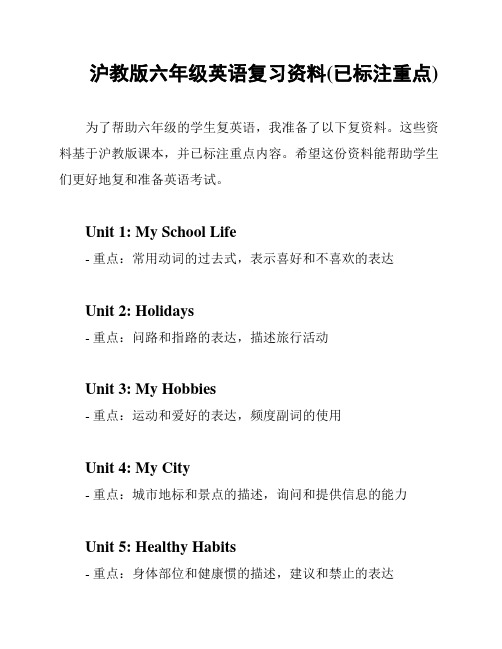
沪教版六年级英语复习资料(已标注重点)
为了帮助六年级的学生复英语,我准备了以下复资料。
这些资料基于沪教版课本,并已标注重点内容。
希望这份资料能帮助学生们更好地复和准备英语考试。
Unit 1: My School Life
- 重点:常用动词的过去式,表示喜好和不喜欢的表达
Unit 2: Holidays
- 重点:问路和指路的表达,描述旅行活动
Unit 3: My Hobbies
- 重点:运动和爱好的表达,频度副词的使用
Unit 4: My City
- 重点:城市地标和景点的描述,询问和提供信息的能力
Unit 5: Healthy Habits
- 重点:身体部位和健康惯的描述,建议和禁止的表达
Unit 6: At the Zoo
- 重点:描述动物的外貌和行为,询问和提供信息的能力
Unit 7: Food and Drinks
- 重点:食物和饮料的名称,句式“What do you want?”的用法
Unit 8: My Family
- 重点:家庭成员和关系的描述,家庭活动的表达
Unit 9: My Daily Routine
- 重点:日常活动的表达,日常时间的描述
Unit 10: Jobs
- 重点:职业名称和工作内容的描述,询问和回答关于职业的问题
以上是本复资料的主要内容。
希望学生们能通过复这些重点内容来巩固英语知识,取得优异的成绩。
祝大家研究愉快!
(注意:本文档内容仅供复习参考,具体考试内容以教材为准。
)。
沪教版六下英语单元知识汇总
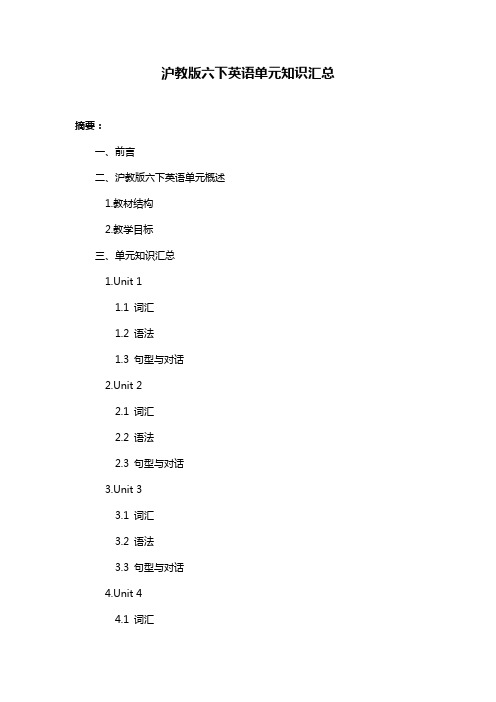
沪教版六下英语单元知识汇总摘要:一、前言二、沪教版六下英语单元概述1.教材结构2.教学目标三、单元知识汇总1.Unit 11.1 词汇1.2 语法1.3 句型与对话2.Unit 22.1 词汇2.2 语法2.3 句型与对话3.Unit 33.1 词汇3.2 语法3.3 句型与对话4.Unit 44.1 词汇4.2 语法4.3 句型与对话5.Unit 55.1 词汇5.2 语法5.3 句型与对话四、学习建议与总结正文:一、前言沪教版六下英语教材是根据《义务教育英语课程标准》的要求,为小学六年级学生编写的一套英语教材。
这套教材旨在帮助学生巩固和拓展已学知识,提高学生的英语听、说、读、写能力,为进入初中阶段打下良好的基础。
二、沪教版六下英语单元概述1.教材结构沪教版六下英语教材共分为五个单元,每个单元围绕一个主题展开,涉及生活、自然、社会等方面。
每个单元包括词汇、语法、句型与对话等内容,形式丰富多样,有利于激发学生的学习兴趣。
2.教学目标(1)掌握本册书中出现的重点词汇和短语,能正确运用所学词汇进行口头和书面表达。
(2)学习和掌握本册书中的语法知识点,能正确运用所学语法知识进行句子的构造和解析。
(3)熟练运用本册书中的句型与对话,提高学生的英语交际能力。
三、单元知识汇总1.Unit 1(1.1)词汇:如家庭、职业、学校等相关的单词和短语。
(1.2)语法:一般现在时的肯定句、否定句和疑问句。
(1.3)句型与对话:介绍家庭成员、职业、学校和日常生活等方面的句型和对话。
2.Unit 2(2.1)词汇:如身体部位、疾病、药物等相关的单词和短语。
(2.2)语法:一般现在时的特殊疑问句。
(2.3)句型与对话:询问和描述身体部位、疾病、药物等方面的句型和对话。
3.Unit 3(3.1)词汇:如水果、蔬菜、食品等相关的单词和短语。
(3.2)语法:一般现在时的一般疑问句。
(3.3)句型与对话:询问和描述水果、蔬菜、食品等方面的句型和对话。
沪教版六年级英语下册(上海牛津6B)知识点总结
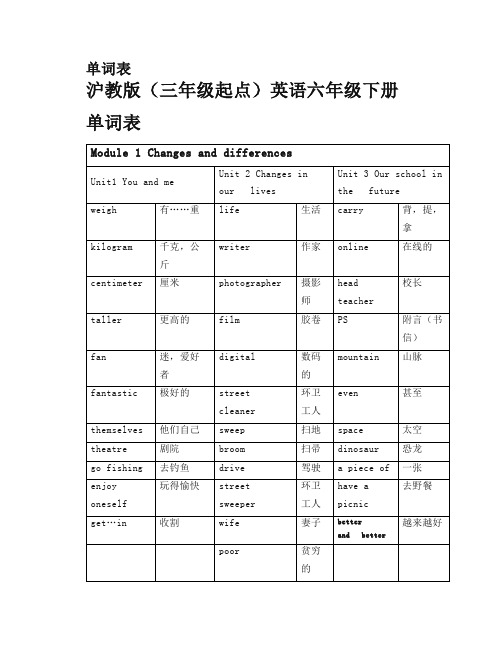
lazy
懒惰的
take off
脱掉
roof
屋顶
yard
院子
hit
碰撞
see the world
见世面
one by one
一个接一个地
look out of
往外看
even
甚至
themselves
他们自己
sweep
扫地
space
太空
theatre
剧院
broom
扫帚
dinosaur
恐龙
go fishing
去钓鱼
drive
驾驶
a piece of
一张
enjoy oneself
玩得愉快
street sweeper
环卫工人
have a picnic
去野餐
get…in
收割
油
craft
手艺,工艺
long race
长跑
oil painting
油画
crown
王冠
short race
短跑
powerful
强有力的
scissors
剪刀
win
获胜
ink
墨水
tape
胶带
long jump
跳远
brush
画笔,刷子
glue
胶水
high jump
跳高
paints
绘画颜料
saw
锯
swimsuit
kilogram
千克,公斤
writer
作家
online
在线的
centimeter
厘米
photographer
六年级英语下册Module4Unit10Greatstorybooks重点知识梳理牛津沪教版
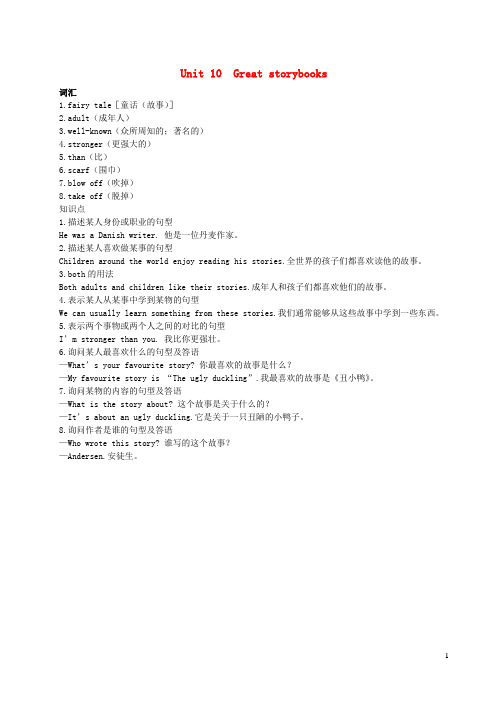
Unit 10 Great storybooks词汇1.fairy tale[童话(故事)]2.adult(成年人)3.well-known(众所周知的;著名的)4.stronger(更强大的)5.than(比)6.scarf(围巾)7.blow off(吹掉)8.take off(脱掉)知识点1.描述某人身份或职业的句型He was a Danish writer. 他是一位丹麦作家。
2.描述某人喜欢做某事的句型Children around the world enjoy reading his stories.全世界的孩子们都喜欢读他的故事。
3.both的用法Both adults and children like their stories.成年人和孩子们都喜欢他们的故事。
4.表示某人从某事中学到某物的句型We can usually learn something from these stories.我们通常能够从这些故事中学到一些东西。
5.表示两个事物或两个人之间的对比的句型I’m stronger than you. 我比你更强壮。
6.询问某人最喜欢什么的句型及答语—What’s your favourite story? 你最喜欢的故事是什么?—My favourite story is “The ugly duckling”.我最喜欢的故事是《丑小鸭》。
7.询问某物的内容的句型及答语—What is the story about? 这个故事是关于什么的?—It’s about an ugly duckling.它是关于一只丑陋的小鸭子。
8.询问作者是谁的句型及答语—Who wrote this story? 谁写的这个故事?—Andersen.安徒生。
1。
沪教版英语六下知识点梳理
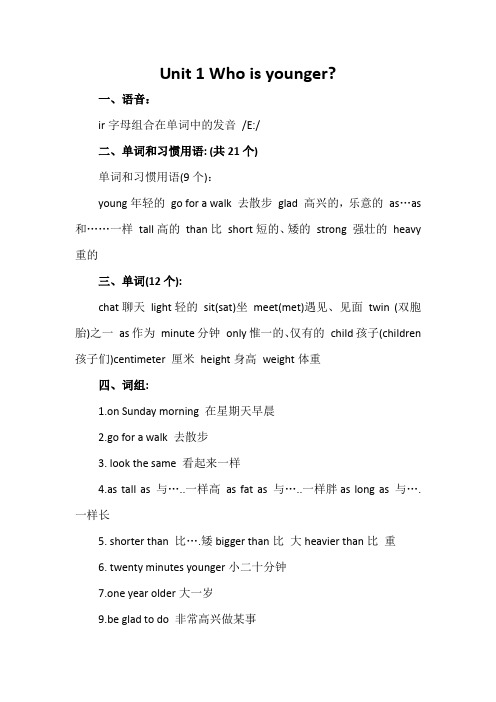
Unit 1 Who is younger?一、语音:ir字母组合在单词中的发音/E:/二、单词和习惯用语: (共21个)单词和习惯用语(9个):young年轻的go for a walk 去散步glad 高兴的,乐意的as…as 和……一样tall高的than比short短的、矮的strong 强壮的heavy 重的三、单词(12个):chat聊天light轻的sit(sat)坐meet(met)遇见、见面twin (双胞胎)之一as作为minute分钟only惟一的、仅有的child孩子(children 孩子们)centimeter 厘米height身高weight体重四、词组:1.on Sunday morning 在星期天早晨2.go for a walk 去散步3. look the same 看起来一样4.as tall as 与…..一样高as fat as 与…..一样胖as long as 与….一样长5. shorter than 比….矮bigger than比大heavier than比重6. twenty minutes younger小二十分钟7.one year older大一岁9.be glad to do 非常高兴做某事10.a twin sister 双胞胎姐妹11.how old 多大12.the only child 仅有的一个孩子13.a tall boy 一个高个子的男孩14.a young teacher 一位年轻的教师15.some heavy boxes 一些重的盒子16.your old friend(s)你的老朋友17.a strong goalkeeper 一个强壮的守门员18.the girl in red 穿红衣服的女孩19.yours or mine 你的还是我的20.look young 看起来年轻21.have a chat 聊天、闲谈五、形容词比较级:A.直接加er/rtall---________light----________young--_________old---________strong --___small--_________late---_________long---_________short--________ nice--- _____B.双写加erbig-------_________ fat-----_________ thin---________ hot---________C.去y改i加erheavy---_________ early---__________ busy---__________D不规则good---_______ many---________ much---______ bad/ill ---_____ little---_______六、句型:1、A+谓语(be动词)+形容词比较级+than +B A比B……Who’s younger than him ? 谁比他年轻?My brother is younger than him . 我弟弟比他年轻。
最新牛津英语沪教版六年级下册Module1知识点以及同步练习
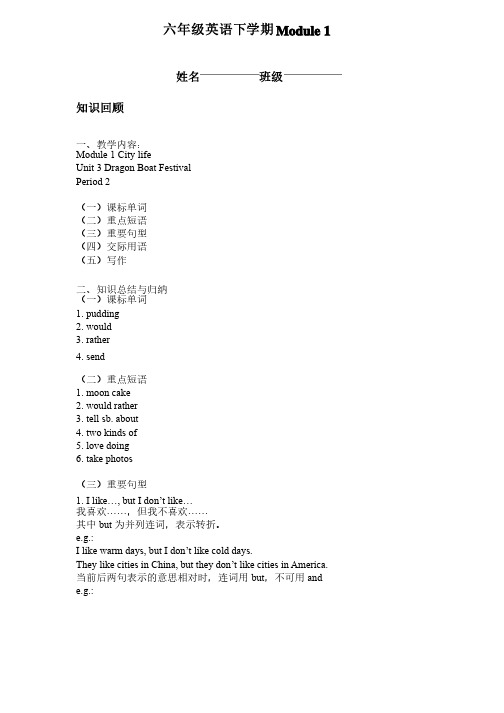
六年级英语下学期Module 1姓名 班级知识回顾一、教学内容:一、教学内容: Module 1 City lifeUnit 3 Dragon Boat FestivalPeriod 2(一)课标单词(一)课标单词(二)重点短语(二)重点短语(三)重要句型(三)重要句型(四)交际用语(四)交际用语(五)写作(五)写作二、知识总结与归纳二、知识总结与归纳 (一)课标单词(一)课标单词1. pudding2. would3. rather4. send(二)重点短语(二)重点短语1. moon cake2. would rather3. tell sb. about4. two kinds of5. love doing6. take photos(三)重要句型(三)重要句型1. I like…, but I don’t like… 我喜欢……,但我不喜欢……其中but 为并列连词,表示转折。
为并列连词,表示转折。
e.g.:I like warm days, but I don’t like cold days.They like cities in China, but they don’t like cities in America.当前后两句表示的意思相对时,连词用but ,不可用ande.g.:Kitty likes picnics, but she doesn’t like barbecues. My parents like tea, but they don’t like coffee.不可说不可说Kitty likes picnics, and she doesn’t like barbecues.and 表示前后两句意思没有冲突或者递进时使用。
表示前后两句意思没有冲突或者递进时使用。
e.g.:Kitty likes picnics, and she likes swimming.2. would like…想要想要同义短语:want …would like 后可跟两种形式后可跟两种形式1). would like + n. e.g.:I would like an apple.Billy would not like hotdogs.Would you like some coffee?2). would like + to doe.g.:Jimmy would like to give his father a birthday present.My mother would not like to wash the clothes.Would you like to tell me something about you?I like summer holidays with rain, but I don’t like winter holidays without snow.3. would rather 宁愿宁愿结构:would rather + do缩写形式为:’d rather doe .g.:I would rather go out.She’d rather read an English text.———— Would you like to go shopping with me? Would you like to go shopping with me?—— No, thank you. I’d rather stay at home.(四)交际用语(四)交际用语Would you like …? 1. 肯定回答肯定回答Yes, please. I like… 2. 否定回答否定回答No, thanks. I don’t like…. I’d rather …e.g.:————Would you like some biscuits? Would you like some biscuits?————Yes, please. I like biscuits. Yes, please. I like biscuits./ / ———— No, thanks. I don’t like biscuits. I’d rather have a sandwich. 表示否定意思时,不可说: No, I don’t like…(五)写作(五)写作 Write an e-mail to your friend Tina about the Spring Festival.You can use the following information to help you.Spring Festival1. date: the first day in the first lunar month2. eat dumplings and visit relatives3. kinds of dumplings: dumplings with meat dumplings with vegetables, dumplings with shrimps4. your preference (喜好)(喜好)5. you love playing basketball6. you are going to play with your cousinsTo:************Subject: Spring FestivalDear _________How are you? I’d like to tell you something about ______________. Spring Festival is __________________________.People usually eat ___________ and ________________ to celebrate this festival.There are some kinds of dumplings. They are __________, _____ and ___________. I like _____________, but I don’t like ________________.I love _________. I am going to ________ with my ______.I hope to get your letter soon.Yours _________范文范文To:************Subject: Spring FestivalDear TinaHow are you? I’d like to tell you something about the Spring Festival. Spring Festival is on the first day of the first lunar month.People usually eat dumplings and visit relatives to celebrate this festival.There are some kinds of dumplings. They are dumplings with meat, dumplings with vegetables and dumplings with shrimps. I like dumplings with meat, but I don’t like dumplings with vegetables.I love playing basketball. I am going to play basketball with my cousins.I hope to get your letter soon.YoursRachel典型例题I. Read and fill in the blanks.1. P______ is a kind of sweet food. It’ s popular in America.2. I have written an e-2. I have written an e-mail. Now I’m going to s____ it.mail. Now I’m going to s____ it.3. Do you r______ like coffee? Simon told me you don’t like bitter (苦的)drink.4. D_______ are Chinese traditional (传统的)food.5. In KFC, we can have h______. They are delicious.II. Put the Chinese phrases into English.1. 两种两种2. 宁愿宁愿3. 拍照拍照4. 月饼月饼5. 告诉某人关于告诉某人关于6. 爱做某事爱做某事III. Fill in the blanks.Rice dumplingsEddie Kitty Kelly Sweet, with beans √ √ Sweet, without beans √ √ Salty, with meat and beans × × Salty, without meat or beans ×× Eddie:I like _________ rice dumplings, but I don’t like the _______ ones.Kitty:I like the ____________ with _________ , but I don’t like the _____ with ____. Kelly:I _________ without _______, but __________ without __________.答案:答案:I.1. Pudding2. send3. really4. Dumplings5. hamburgersII.1. two kinds of2. would rather3. take photos4. moon cake5. tell sb. about6. love doing III.Eddie:I like I like sweet rice dumplings, but I don’t like the salty ones.sweet rice dumplings, but I don’t like the salty ones.Kitty:I like the sweet rice dumplings with beans, but I don’t like the salty ones with meatand beans. Kelly:I like sweet rice dumplings without beans, but I don’t like salty ones without meat or beans.模拟试题(答题时间:30分钟)I. Choose the best answer.1. Who is good _____ writing and drawing in your class?A. onB. atC. inD. to 2. I know only ____ about the Mid-autumn Festival, not much.A. a littleB. littleC. a fewD. few 3. 3. —————— Would you like to watch TV? Would you like to watch TV?———— _____________. _____________.A. Yes, OK.B. Give me.C. Here you areD. Yes, please. 4. He doesn’t like bread. He _______ have some dumplings.A. would ratherB. wouldC. would likeD. is 5. They love making sandcastles, ____ they love flying kites, _____. A. and…also B. and…too C. but…eitherD. but …too 6. Father doesn’t like film, ____ he likes concerts.A. andB. alsoC. butD. soII. Rewrite the sentences.1. Mr Wang would like to have some puddings. (改为否定句)(改为否定句)___________________________________ 2. Her daughter would rather have a toy rabbit. (对划线部分提问)(对划线部分提问)___________________________________3. I ate some noodles for lunch. (改为一般疑问句)(改为一般疑问句)________________________________4. There are 3 kinds of fruit in my bag. (对划线部分提问)(对划线部分提问)________________________________III. Fill in the blanks.28 September is the Mid-autumn F__1___ this year. It is on the 15th day of the e__2__ month of the Chinese l__3__ year. It has a history of m__4__ than 4, 000 years. At this time, people began to get fruit, v__5__ and grains. It is also a time forf_6__ to get together. People usually stay out and w__7__ the beautiful moon.【试题答案】I 、1. B2. A3. D4. A5. B6. CII 、1. Mr Wang would not like to have any puddings.2. What would her daughter rather have?3. Did you eat any noodles for lunch?4. How many kinds of fruit are there in your bag?III 、1. Festival2. eighth3. lunar4. more5. vegetables6. families7. watch六年级英语下册Module 1姓名 班级I. Choose the best answer.1. The computer games are interesting, but don’t _______ to do your homework first.A. needB. likeC. wantD. forget2. It’s very important for u 2. It’s very important for us to practice _______English more. s to practice _______English more.A. speakB. sayC. speakingD. to speak3. Susan eats _______ sweets, so she is getting fatter and fatter.A. too manyB. too muchC. too littleD. too few4. Ken can play _________ basketbal 4. Ken can play _________ basketball very well, but he can’t play ________ piano.l very well, but he can’t play ________ piano.A. /, /B. the, theC. /, theD. the, /5. ________ students in your class like reading storybooks?A. How manyB. How muchC. How longD. How often6. Tina’s favourite outdoor activity is ______ fishing. A. going B. to go C. goes D. go7. John’s father is tired ________ he did too much work.A. soB. butC. andD. because8. He ______ likes music.A. realB. reallyC. veryD. very muchII. Choose the word or an expression which has the same meaning.A. likeB. riding a bicycleC. rememberD. someE. go to the cinemaF. forgot1. Please 1. Please don’t forget to get there on time. Don’t be late again.don’t forget to get there on time. Don’t be late again.2. My son really likes cycling. 2. My son really likes cycling. He thinks it’s fun.He thinks it’s fun.3. Would you like to see a film with me tonight?4. Jane and I bought several books about computer games today.5. Students in my class really enjoy working and playing.6. Granny 6. Granny didn’t remember didn’t remember didn’t remember to buy me a birthday card once again. to buy me a birthday card once again.III. Rewrite the sentences.1. Grace likes lying to people very much. (改为否定句)(改为否定句)___________________________________2. Meatballs are my favourite food.(保持原句意思不变)(保持原句意思不变)I ______ meatballs ________ 3. We really enjoy playing. (改为一般疑问句)(改为一般疑问句)________________________________4. Seeing a film is an indoor activity. (对划线部分提问)(对划线部分提问)________________________________试题答案I.1. D2. C3. A4. C5. A6. A7. D8. BII.1. C2. B3. E4. D5. A6. F III.1. Grace doesn’t like lying to people very much. / Gr 1. Grace doesn’t like lying to people very much. / Grace hates lying to people very ace hates lying to people very much.2. like, best.3. Do you/ we really enjoy playing?4. What kind of activity is seeing a film?。
沪教版六下英语单元知识汇总
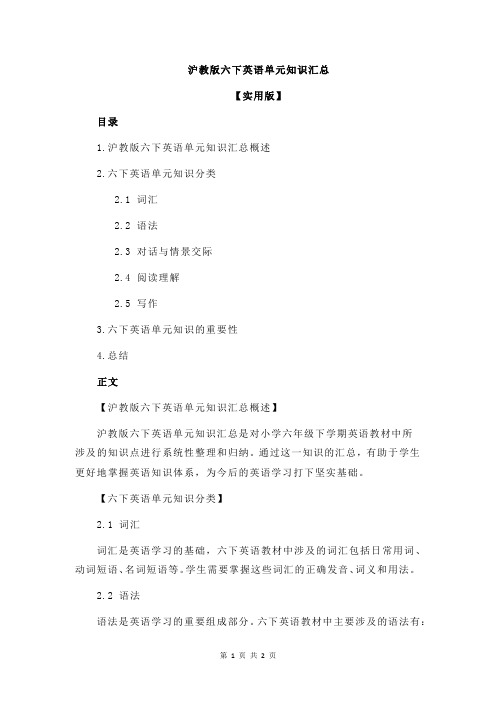
沪教版六下英语单元知识汇总【实用版】目录1.沪教版六下英语单元知识汇总概述2.六下英语单元知识分类2.1 词汇2.2 语法2.3 对话与情景交际2.4 阅读理解2.5 写作3.六下英语单元知识的重要性4.总结正文【沪教版六下英语单元知识汇总概述】沪教版六下英语单元知识汇总是对小学六年级下学期英语教材中所涉及的知识点进行系统性整理和归纳。
通过这一知识的汇总,有助于学生更好地掌握英语知识体系,为今后的英语学习打下坚实基础。
【六下英语单元知识分类】2.1 词汇词汇是英语学习的基础,六下英语教材中涉及的词汇包括日常用词、动词短语、名词短语等。
学生需要掌握这些词汇的正确发音、词义和用法。
2.2 语法语法是英语学习的重要组成部分。
六下英语教材中主要涉及的语法有:一般现在时、一般过去时、一般将来时、现在进行时、过去进行时、将来进行时等时态;名词、冠词、代词、介词、连词等词性;以及句子结构等。
2.3 对话与情景交际对话与情景交际是培养学生英语口语能力的有效途径。
六下英语教材中包含了多种日常场景的对话,如:询问时间、询问方向、购物、介绍家庭等。
学生需要通过模仿和练习,提高英语口语表达能力。
2.4 阅读理解阅读理解是提高学生英语综合能力的重要环节。
六下英语教材中选取了富有趣味性、知识性的阅读材料,学生需要通过阅读理解文章内容,提高英语阅读速度和理解能力。
2.5 写作写作是培养学生英语书面表达能力的关键。
六下英语教材中涉及的写作类型包括:日记、书信、看图作文等。
学生需要学会运用所学词汇和语法知识,进行有效的书面表达。
【六下英语单元知识的重要性】掌握六下英语单元知识对于学生来说具有重要意义。
通过学习这些知识,学生能够更好地应对各类英语考试,提高英语综合素质,为初中阶段的英语学习打下坚实基础。
【总结】沪教版六下英语单元知识汇总是小学阶段英语学习的重要内容,学生需要对词汇、语法、对话与情景交际、阅读理解和写作等方面进行全面掌握。
沪教版六年级英语下册-全套复习资料
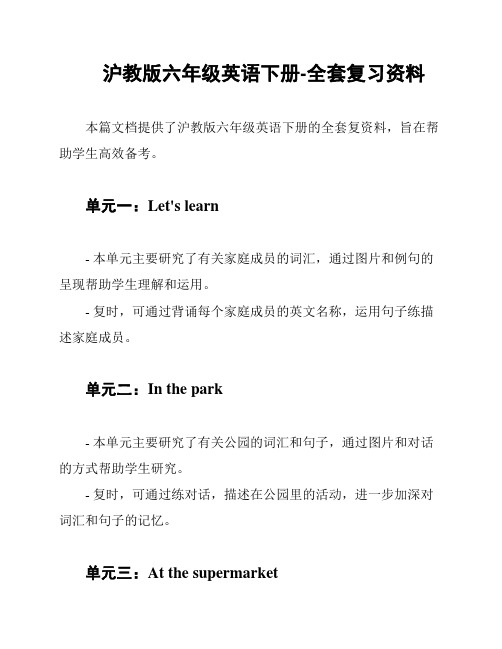
沪教版六年级英语下册-全套复习资料本篇文档提供了沪教版六年级英语下册的全套复资料,旨在帮助学生高效备考。
单元一:Let's learn- 本单元主要研究了有关家庭成员的词汇,通过图片和例句的呈现帮助学生理解和运用。
- 复时,可通过背诵每个家庭成员的英文名称,运用句子练描述家庭成员。
单元二:In the park- 本单元主要研究了有关公园的词汇和句子,通过图片和对话的方式帮助学生研究。
- 复时,可通过练对话,描述在公园里的活动,进一步加深对词汇和句子的记忆。
单元三:At the supermarket- 本单元主要研究了有关超市的词汇和句子,通过图片和情景的展示帮助学生研究。
- 复时,可通过模拟超市购物的情境,练对话和表达购物需求。
单元四:At the farm- 本单元主要研究了有关农场的词汇和句子,通过图片和对话的方式帮助学生研究。
- 复时,可通过回忆和描述农场的动物、农作物等内容,加深对词汇和句子的记忆。
单元五:At the zoo- 本单元主要研究了有关动物园的词汇和句子,通过图片和对话的方式帮助学生研究。
- 复时,可通过练对话,描述动物园的动物和活动,加深对词汇和句子的印象。
单元六:In the mountains- 本单元主要研究了有关山区的词汇和句子,通过图片和情境的展示帮助学生研究。
- 复时,可通过回忆、描述山区的景物和活动等内容,巩固词汇和句子的掌握。
单元七:At the beach- 本单元主要研究了有关海滩的词汇和句子,通过图片和对话的方式帮助学生研究。
- 复时,可通过模拟海滩的情境,练对话和表达海滩上的活动。
单元八:At the hospital- 本单元主要研究了有关医院的词汇和句子,通过图片和情景的展示帮助学生研究。
- 复时,可通过回顾和描述医院里的场景和医疗服务,加深对词汇和句子的记忆。
以上就是沪教版六年级英语下册的全套复习资料。
希望这份资料能帮助学生们复习英语知识,更好地备考。
沪教牛津版六年级下册单元知识点一览表
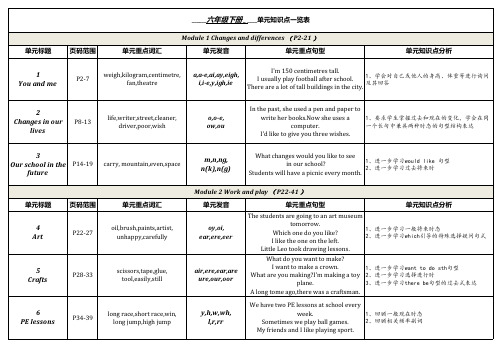
7 Helping others
P42-47
bell,neck,ago,gatekeeper,prais e,praise…for…
Syllables
I can't find my dog. I saw her half an hour ago. I'm going to ask the gatekeeper.
1、进一步学习want to do sth句型 2、进一步学习选择进行时 3、进一步学习there be句型的过去式表达
A long tome ago,there was a craftsman.
y,h,w,wh, l,r,rr
We have two PE lessons at school every
computer.
一个长句中兼具两种时态的句型结构表达
I'd like to give you three wishes.
3 Our school in the P14-19
future
carry, mountain,even,space
m,n,ng, n(k),n(g)
What changes would you like to see
2 Changes in our
lives
P8-13
life,writer,street,cleaner, driver,poor,wish
o,o-e, ow,ou
In the past, she used a pen and paper to
write her books.Now she uses a 1、要求学生掌握过去和现在的变化,学会在同
in our school?
1、进一步学习would like 句型 2、进一步学习过去将来时
上海牛津沪教版六年级(下)同步讲义unit4
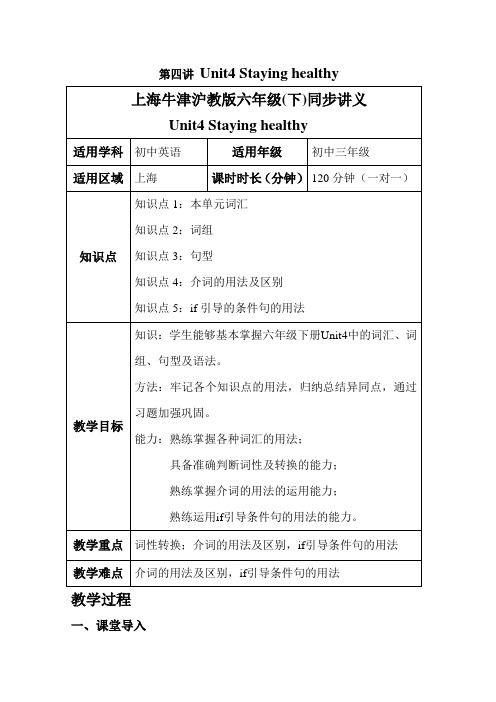
第四讲Unit4 Staying healthy教学过程一、课堂导入教师讲述一个与本节课题目有关的英文小故事,引出今日所要讲解的知识点,然后让学生简单梳理一下所涉及的问题,带着问题学习本节课的内容。
二、复习预习教师引导学生复习上节课学的重点内容,检测单词的用法,(以提问、回顾的形式进行),针对上节课的作业进行讲评、订正、答疑,并通过英文小故事导入本节课所要学习的新知识。
三、知识讲解1. 知识点一:重点单词1)indoor ['ɪndɔː]【词性】adj.【词义】室内的,户内的【易混淆点】inside adj. 内部的,里面的【经典例句】There is a big indoor swimming pool in this hotel.这家旅馆内有一个大的室内游泳馆。
2)outdoor ['aʊtdɔː]【词性】adj.【词义】室外的,户外的【易混淆点】outside adj.外部的,在外面的【经典例句】They needed the outside help.他们需要来自外界的帮助。
3)really ['riːəli]【词性】adv.【词义】真正地,的确【易混淆点】surely adv.真正地【经典例句】I really care about the students in my class.我的确喜欢这个班里的学生。
4)forget [fə'get]【词性】v.【词义】忘记【易混淆点】remember n.记的【经典例句】You'd better forget for the moment.你最好暂时忘掉吧。
5)playground [ 'pleigraʊnd ]【词性】n.【词义】操场【易混淆点】field n.场地【经典例句】The city has several playgrounds for children.这座城市有好几个儿童游乐场。
六年级沪教英语知识点汇总
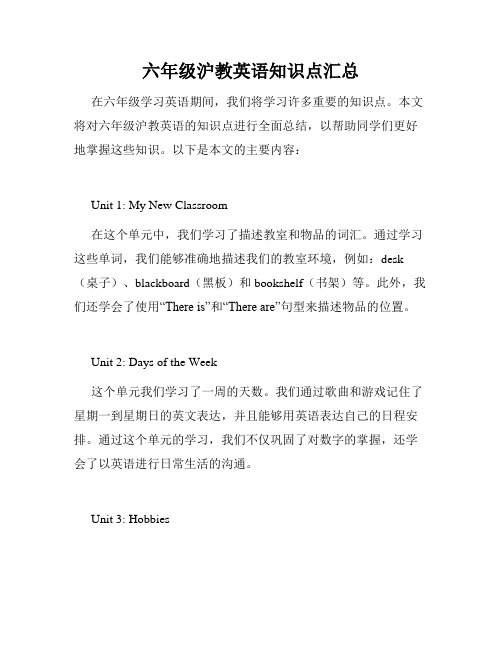
六年级沪教英语知识点汇总在六年级学习英语期间,我们将学习许多重要的知识点。
本文将对六年级沪教英语的知识点进行全面总结,以帮助同学们更好地掌握这些知识。
以下是本文的主要内容:Unit 1: My New Classroom在这个单元中,我们学习了描述教室和物品的词汇。
通过学习这些单词,我们能够准确地描述我们的教室环境,例如:desk (桌子)、blackboard(黑板)和bookshelf(书架)等。
此外,我们还学会了使用“There is”和“There are”句型来描述物品的位置。
Unit 2: Days of the Week这个单元我们学习了一周的天数。
我们通过歌曲和游戏记住了星期一到星期日的英文表达,并且能够用英语表达自己的日程安排。
通过这个单元的学习,我们不仅巩固了对数字的掌握,还学会了以英语进行日常生活的沟通。
Unit 3: Hobbies在这个单元中,我们学习了描述爱好和活动的词汇。
我们能够用英语表达我们喜欢的运动、音乐和游戏等。
通过这个单元的学习,我们培养了兴趣爱好,同时扩展了我们的词汇量。
Unit 4: Weather这个单元我们学习了描述天气的词汇。
我们能够用英语表达不同的天气情况,例如:sunny(晴天)、cloudy(多云)和rainy (下雨的)等。
通过学习这些词汇,我们可以更好地与他人讨论天气。
Unit 5: My Schoolbag在这个单元中,我们学习了描述学习用品和颜色的词汇。
我们能够用英语描述自己的书包和里面的物品,并且能够用颜色来形容这些物品。
这些知识对我们购物和日常生活非常有用。
Unit 6: The Environment这个单元我们学习了环境保护的重要性。
我们能够用英语表达保护环境的方法,并且理解环境污染对我们生活的影响。
通过学习这个单元,我们将更加关注环境问题,并积极参与环保行动。
Unit 7: Daily Routines在这个单元中,我们学习了描述日常活动的词汇。
沪教版六下英语单元知识汇总

沪教版六下英语单元知识汇总摘要:一、单元知识点概述1.单词和短语2.句型和语法3.文化背景知识二、具体知识点解析1.单词和短语1.1 的新单词和短语1.2 复习已学过的单词和短语2.句型和语法2.1 重点句型2.2 语法点解析3.文化背景知识3.1 相关习俗和传统3.2 相关国家和地区简介正文:沪教版六下英语单元知识汇总一、单元知识点概述沪教版六下英语单元知识汇总主要分为单词和短语、句型和语法、文化背景知识三个部分。
以下将分别对这些部分进行详细解析,以帮助学生更好地掌握本册教材的内容。
1.单词和短语在本册教材中,我们学习了许多新单词和短语。
这些新单词和短语涵盖了各种场景和主题,如地点、运动、兴趣爱好等。
通过学习这些单词和短语,学生们可以丰富自己的词汇量,并在实际生活中运用到这些知识。
此外,本单元还复习了一些已学过的单词和短语。
这对于巩固学生的词汇基础具有重要意义,也为他们在后续的学习中运用这些词汇提供了便利。
2.句型和语法在本单元中,我们重点学习了若干句型和语法点。
这些句型和语法知识是英语学习的基础,对于提高学生的口语和书面表达能力具有重要意义。
3.文化背景知识沪教版六下英语教材在传授语言知识的同时,也注重培养学生的跨文化交际能力。
在本单元中,我们介绍了与课文内容相关的习俗和传统,以及一些国家和地区的简介。
通过这些知识,学生可以更好地了解英语国家的文化,为日后与外国朋友交流打下基础。
二、具体知识点解析1.单词和短语在本单元中,我们学习了许多新单词和短语。
例如:- 新单词:kilogram(千克)、centimetre(厘米)、fan(足球、电影等迷)、theatre(剧院)、life(生活)、writer(作家)等。
- 短语:do a lot of exercise(做大量的运动)、play basketball(打篮球)、after school(放学后)、play football(踢足球)、a football fan(足球迷)、go fishing(去钓鱼)、go to museums(去博物馆)等。
上海小学英语六年级下册知识点汇总
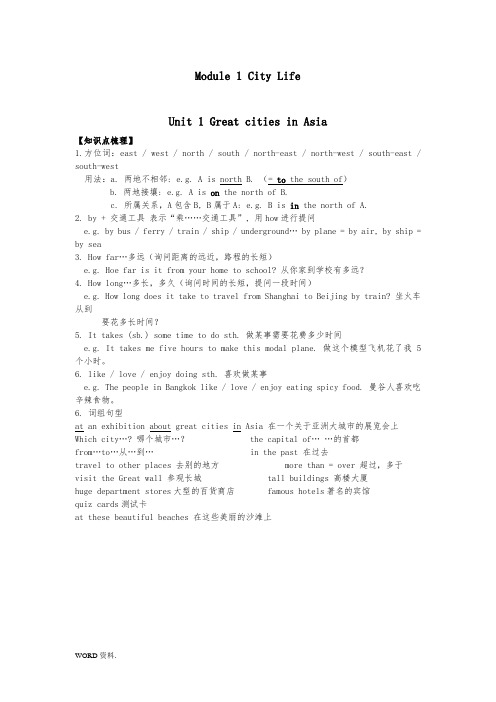
Module 1 City LifeUnit 1 Great cities in Asia【知识点梳理】1.方位词:east / west / north / south / north-east / north-west / south-east / south-west用法:a. 两地不相邻: e.g. A is north B. (= to the south of)b. 两地接壤: e.g. A is on the north of B.c. 所属关系,A包含B, B属于A: e.g. B is in the north of A.2. by + 交通工具表示“乘……交通工具”, 用how进行提问e.g. by bus / ferry / train / ship / underground… by plane = by air, by ship = by sea3. How far…多远(询问距离的远近,路程的长短)e.g. Hoe far is it from your home to school? 从你家到学校有多远?4. How long…多长,多久(询问时间的长短,提问一段时间)e.g. How long does it take to travel from Shanghai to Beijing by train? 坐火车从到要花多长时间?5. It takes (sb.) some time to do sth. 做某事需要花费多少时间e.g. It takes me five hours to make this modal plane. 做这个模型飞机花了我5个小时。
6. like / love / enjoy doing sth. 喜欢做某事e.g. The people in Bangkok like / love / enjoy eating spicy food. 曼谷人喜欢吃辛辣食物。
- 1、下载文档前请自行甄别文档内容的完整性,平台不提供额外的编辑、内容补充、找答案等附加服务。
- 2、"仅部分预览"的文档,不可在线预览部分如存在完整性等问题,可反馈申请退款(可完整预览的文档不适用该条件!)。
- 3、如文档侵犯您的权益,请联系客服反馈,我们会尽快为您处理(人工客服工作时间:9:00-18:30)。
Unit1一. 单词上补充内容如下:Asian(a.)亚洲的,亚洲人的(n.) 亚洲人an Asian Japanese(a.)日本的,日本人的(n.)日本人information(不可数名词)millions of, 数百万的build(v.)建造builder(n,)建造者be famous for ……因……而著名二. 词组the capital of China 中国的首都which city 哪个城市That’s right. 正确how far 多远from Shanghai to Beijing 从上海到北京by train 坐火车how long 多长时间the Great Wall 长城more than=over 超过,多于in Beijing (in +大地方) 在北京enjoy doing sth. 喜欢做某事go shopping 去购物三.重点笔记1.That’s all right 没关系。
All right好吧,好的。
That’s right 正确,对2. by train/ plane/air/ship/sea..…坐火车/飞机/飞机/船/船(介词通常位于句末)a. I often go to school _____ bus.A. onB. by theC. by aD. by (D,固定词组)= I often _____ _____ _____ _____school. (take a bus to ) 乘坐公交车到3. It takes sb. some time to do sth. 做某事花费某人一些时间。
a. It ______me two hours to finish my homework yesterday.A. costB. tookC. paidD. spent (B. 固定句型)4. hundred 百, thousand 千, million百万这些单词在表达数字时不能加s, 以hundre为例,只在固定词组中hundreds of…能加s(即+s, +of)体会:hundreds of 数百的,成千上万的。
three hundred 三百5. go doing sth. 去做某事a.I often go _____(swim) in summer. ( swimming )Unit 2一、词汇部分:1.airport (n.) 机场近义词:airfield词组:at the airport 在机场2.before (adv.) 以前反义词:after before (prep.) 在-----以前反义词:after 在---以后3.several (a.)几个=a few (后面常跟名词复数)4. however (adv.) 然而(常常放句首,也可以放句中,但有逗号与句子分开)注意:同义词:but (只能用在句中)5. flight (n.) 航班动词:fly6. departure (n.) 离开;出发departure time 起飞时间arrival time 到达时间动词:depart7. have to /has to 不得不(后面跟动词原形)同义词:must注意:have to/has to 的一般疑问句要用助动词来帮助提问,否定句也是如此。
8.worry (v.) (n.) 担心;担忧worry about sb/sth. 为----担忧=be worried about sb./sth.9.note (n.) 注释;提醒notebook 笔记本10. bring (v.) 带来反义词:take 带走carry 随身带get 去取二.课文部分:1.Mrs,Wang and Grandma are going to Los Angeles, the USA.are going 表示“将要去”,在英语中,come, go ,leave, visit 这四个词的进行时态,可以表示“将要来/去/离开/拜访”。
3.They plan to stay there for two year.4.plan to do sth. 计划做某事= be going to do sth.= be about to do sth.3.Mrs. Wang and Grandma have not been to the USA before.have/has been to 曾经去过某地(人已回来)have/has gone to 去了某地(人未回来)have/has been in 呆在某地5.Grandma has bought Aunt Judy plenty of T-shirts.buy sb. Sth. =buy sth for sb. 为某人买某物6.However, they haven’t packed their suitcase yet.pack (v.) 装箱;打包(n.)包,裹7.Have you got enough space in your suitcase?1)space (n.) 空间=room 不可数名词space(n.)太空spaceship 宇宙飞船2)enough (adj.) 足够的修饰名词时放在名词前面,修饰形容词或副词时放在他们后面。
7.Let me drive you to the airport.drive sb to sp. 开车送某人去某地7.All passengers must arrive at the airport two hours before the departure time. arrive at 到达(小地方) arrive in 到达(大地方)= reach =get to注意:如果是的“到家/到这儿/到那儿”,只能用“arrive/ home/here/there=get home/here/there”,不能加介词。
9.What time does your plane leave for Los Angeles tomorrow?1.) what time 是对具体的时刻提问,而when 是对何时提问2.) leave for 离开去某地京。
10.already,yet .just 用于现在完成时态中。
already ,just 用于肯定句,表示“已经”、“刚刚”yet 用于疑问句和否定句中,表示“还”、“仍然“Unit 3一、词汇部分1.race (n.)比赛通常指速度竞赛,如赛跑、赛车game ( n.) 游戏;比赛通常指竞争性的体育运动,如大型的国内外体育比赛e.2.celebrate (v.)庆祝celebration (n.) 庆祝3.(be)born (v.) 出生注意:born 往往与be动词的过去式连用(was born/were born),它的原形是:bear4.ago (adv.) 以前常用于过去时态中before 在-----之前常用于完成时态中注意:later (adv.) 以后;后来通常也用于过去时态中,表示在具体某个时间之后。
5.country (n.) 国家;乡村6.advice (n.) 忠告;劝告;建议advice(v.)忠告;劝告,建议注意:advice是一个不可数名词,一条建议可以说“a piece of advice”许多建议可以说“ a lot of/much advice”词组:take one’s advice 接受某人的建议give one’s advice 给某人建议7.die (v.) (died ,died)死death (n.) 死亡dead (a.) 死的8.lose (v.) (lost, lost) 输掉;迷失(路);失去9.battle (n.) 战役(常指大的战役)fight (n.) 战斗;打架(常指大的战役中的小战斗)10.danger (n.) 危险dangerous (a.) 危险的be in danger 处于危险中11.remember (v.) 记住反义词:forgetremember to do sth 记得要做某事(还未做)remember doing sth 记得曾经做过某事(已做过)forget to do sth 忘记去做某事(还未做)forget doing sth 忘记曾经做过某事(其实已做过)12.send (v.) (sent,sent) 送;派;寄二、课文部分:1.I would like to know something about the Quyuan.1)know about 了解;知道e注意:know 认识。
2)would like to do sth 想要做某事=want to do sth.注意:would like 可以缩写为‘d likeWould you like to/some-----?表示建议句型,回答可用:Yes,please./No,thanks.2.He loved his country very much.love/like -----very much 非常喜欢=be interested in sth3.the king died and the new king didn’t listen to him.listen to sb./sth 听某人/某事4.It was the fifth day of the fifth lunar month农历的表达法:the first day of the first lunar month 农历正月初一the fifteenth day of the first lunar month农历正月十五the fifteenth day of the eighth lunar month农历八月十五5.I like sweet rice with beans./without beans.with 有,带有反义词:without 没有6.I don’t like salty ones with meat.在英语中,常用代词one代替上文提到过的人或物,ones是one的复数形式。
7.I would rather have s piece of bread.would rather 宁可;宁愿(后面跟动词原形)可以缩写为‘d rather 相当于prefer to do sth.,否定形式为would rather not do sth.8.Qu yuan was very sad.sad(a.) 悲伤的;伤心地sadly(adv.)9.His job was to give advice to the king.10.这是一个常见的句型:sb’s job is to do sth. 在语法上称为动词不定式做表语。
